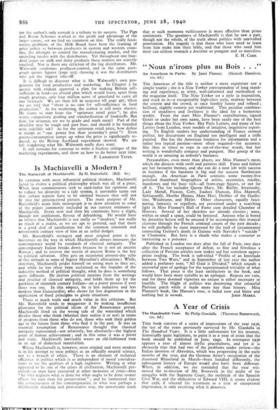" Nous n'irons plus au Bois . . ."
THE American of the title is neither a mere expatriate nor a simple tourist ; she is a New Yorker correspondent of long stand- ing and experience, as witty, well-informed and methodical as the magazine itself. The New Yorker set a style in journalism, and stuck to it—a recognisably high-class style, midway between the coterie and the crowd, at once frankly funny and refined ; brilliant, slightly esoteric yet traditional. This peculiar combina- tion of steadiness and liveliness is the ideal for a humorous weekly. From the start Miss Flanner's contributions, signed Genet or under her own name, have been easily one of the best things about the New Yorker. Her Paris Letters, and many of her Letters from London, were models of intuitive, inquisitive report- ing. To English readers her understanding of France seemed perfect, her discursions on England too intelligent and a trifle puzzled. She has the American fondness for information and a rather less typical passion—most often requited—for accuracy. She likes at times to rope in out-of-the-way words, but her writing is wonderfully compact and pungent. Her gossip of the world is as amusing as nobody's business.
Personalities, even more than places, are Miss Flanner's meat, which she dissects with swift and painless skill. Fame and failure are her favourite themes, and she can do a neat job with success in business if the business is big and the success flamboyant enough. An American in Paris contains some twenty-five polished thumbnail biographies of artists, eccentrics, royalty, murderers and the busy rich—all front-page figures, or not far off it. The list includes Queen Mary, Mr. Bullitt, Stravinsky, Lady Mendl, Picasso, Coty, Isadora Duncan, Elsa Maxwell, Schiaparelli, Marthe Hanau, Mata Hari, Deibler of the Guillo- tine, Weidmann, and Hitler. Other characters, equally fasci- nating, fantastic or repellent, are presented under a searching light in Miss Flanner's Hall of Fame cum detailed Chamber of Horrors. Several of her sketches are already classics ; none, within so small a space, could be bettered. Anyone who is bored by detective fiction will be amazed if he accompanies this ironical cicerone through the French criminal courts of the past decade ; he will probably be most impressed by the trail of circumstance connecting Galmot's death in Guiana with Stavisky's " suicide " at Chamonix. But here is a sleuth who makes a couturier as interesting as a poisoner.
Published in London ten days after the fall of Paris, two days after the French acceptance of defeat, so fine and frivolous a collection of Parisian artides now makes sad but somehow appro- priate reading. The book is sub-titled " Profile of an Interlude between Two Wars," and in September of last year the author added a prefatory note, " All Gaul is Divided," which sounds a sorrowful note of apology for the superannuated triviality of what follows. That piece is the least satisfactory in the book, and would have been more suitable as an epilogue. Regrets are vain, and for these doomed vignettes no excuse is either necessary or feasible. The blight of politics was destroying that colourful Parisian patch while it made more hay than history. Miss Flanner's book, like Hassan's rose, is faded now and bitter and


























 Previous page
Previous page